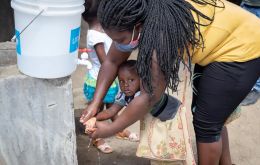MercoPress. South Atlantic News Agency
Health & Science
-
Thursday, November 20th 2025 - 08:48 UTC
Argentine province back to pandemic-era measures as Covid-19 resurges

The Argentine province of Formosa has confirmed a significant resurgence of Covid-19, prompting health officials to re-establish preventative measures associated with the pandemic and leading to an urgent plea to the National Government over delayed vaccine deliveries.
-
Monday, November 17th 2025 - 21:16 UTC
Avian flu decimates seal elephant population in South Georgia; few survivors emerge in Uruguayan beaches

In the last few months there have been at least twenty incidents of elephant seals emerging along Uruguayan beaches, both females and males, and allegedly they belong to “deep South species”, according to local environmental and animal protection organizations such as “FaunaMarinaSOS”.
-
Saturday, November 15th 2025 - 10:32 UTC
Dominican Republic boosts border security as cholera resurges in Haiti

Authorities in the Dominican Republic have upped all border security measures after Haiti's Ministry of Public Health and Population (MSPP), backed by the Pan American Health Organization (PAHO/WHO) and other international agencies, admitted to the spreading of a cholera outbreak, it was reported in the Caribbean island of Hispaniola on Friday.
-
Tuesday, November 11th 2025 - 09:41 UTC
Uruguay chosen to UNESCO Board

Uruguay has secured a seat on the Executive Board of the United Nations Educational, Scientific, and Cultural Organization (UNESCO) for a four-year term, following an election held during the organization's 43rd General Conference in Uzbekistan. The South American country obtained 119 votes from the Member States present at the event.
-
Thursday, November 6th 2025 - 21:48 UTC
Former Argentine VP moots euthanasia bill

Following the approval in Uruguay of the so-called Dignified Death Act (or Euthanasia Law), former Argentine Vice President Julio César Cleto Cobos, now a Radical Civic Union (UCR) Federal Congressman from the province of Mendoza, pushed a similar initiative across the pond.
-
Monday, November 3rd 2025 - 19:52 UTC
Discovery Building, a milestone for Rothera Base and BAS in Antarctica

The 2025/2026 Antarctic season is a landmark for the British Antarctic Survey (BAS) and its Antarctic Infrastructure Modernization Project (AIMP), as the new Discovery Building begins to take on its operational role. Specialist teams will be on site from this month to check the building’s critical systems are working as expected and to carefully manage the removal of six older structures, the functions of which are now integrated within the Discovery Building.
-
Monday, November 3rd 2025 - 10:14 UTC
All eyes on Uruguay's volunteers for euthanasia

The cases of Uruguayan nationals Pablo Cánepa, 39, and Beatriz Gelós, 71, have swept under the limelight following the enactment of the so-called Dignified Death Law bill (or Euthanasia Law). They both suffer from conditions recognized as irreversible and have expressed their intention to seek that procedure once it is finally regulated. Their cases were even mentioned in the parliamentary debate leading to the reform.
-
Thursday, October 30th 2025 - 19:57 UTC
Uruguay: Orsi signs euthanasia bill into law

President Yamandú Orsi signed into law the so-called “Dignified Death” bill, also known as the euthanasia bill. Now the Uruguayan Executive Branch has 180 days to draft the decree that will officially regulate the law's application.
-
Saturday, October 25th 2025 - 10:00 UTC
Punta Arenas planning a world-class aquarium with over 90 Antarctic species

Punta Arenas, extreme south of Chile, is planning and betting big, a future polar aquarium at the International Antarctic Center, CAI, exhibiting over 90 species from the austral ocean, and with four main sponsors, the Magallanes University, the Magallanes Region Government, the Chilean Antarctic Institute and the Chilean Science Ministry
-
Wednesday, October 15th 2025 - 10:54 UTC
South Atlantic Shark Conservation Initiative announced

Argentine and Uruguayan scientists are launching the South Atlantic Shark Conservation Initiative, a collaborative research expedition to secure stronger legal protections for sharks in the Southwest Atlantic, a region critical for marine biodiversity.